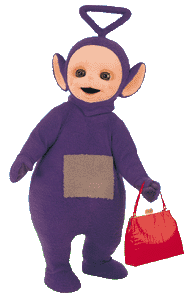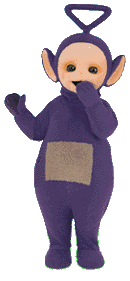Jerry Falwell's Press StatementChildren's Television ProgrammingLynchburg, VA., Feb. 10, 1999 Children’s television is fun. It should be. However, the content of children’s programming—its messages, role models, lessons, and heroes—is no laughing matter. Research shows that on average American children watch 21 to 35 hours of television each week, culminating in some 29,000 hours by the time they are 18 years old. That’s more time than a child spends in the classroom (Pediatrics, October 1994). We know that children’s minds absorb multiple media messages at a phenomenal rate (if they didn’t, toy advertisers wouldn’t spend so much on Saturday morning programming). So, while I’d like to laugh along with those who are encouraging concerned parents and critics to "lighten up" about children’s programming in general, and the Teletubbies in particular, I find this issue far too important to the future and well-being of our children. What could be more important than what we feed the minds of our nation’s children? The article in the February edition of the National Liberty Journal, which encourages parents to screen the content of what their children watch on television, is not the first to mention the implicit sexual preference of one of the Teletubbies characters. * The Washington Post published an editorial last month categorizing gay actress Ellen DeGeneres as "out" and "Tinky Winky, the gay teletubby" as "in" (Jan. 1, 1999). * Time magazine, in an article on transsexuals, states that "in the past five years, several movies, plays, tabloid shows and famous cross-dressers like RuPaul have moved drag from the fringes of gay culture to prime time. Even Teletubbies, a show for toddlers, features Tinky Winky, a boy who carries a red patent-leather purse" (July 20, 1998). * A Dec. 28, 1998 People magazine article states that "gay men have made the purse-toting Tinky Winky a camp icon." As a Christian, I believe that role-modeling the gay lifestyle is damaging to the moral lives of children. I find the flat denials of such a portrayal by Teletubbies producers to be disingenuous and insufficient in answering the questions that have been raised about the Tinky Winky character since the series premiered in England in 1997. Children’s minds are our most precious resource
and should be treated with care. I encourage parents to stand as informed
guardians of the messages communicated to their children through children’s
programming and not to leave that most important of responsibilities in
the hands of others whose motives may be questionable.
Tinky Winky's websiteTeletubbies Website"Evidence" that Tinky Winky is not Gay
|

"A 'Tubby' Ache For Jerry Falwell: Religious Right Leader Sees Gay Threat in Children's TV Character" By Hanna Rosin
Maybe it was the time Tinky Winky gave that "big hug" to Dipsy. Or maybe it was the time he "fell on his back," if you catch the drift. Whatever the tip-off, the Rev. Jerry Falwell has determined that "Teletubbies," that children's show created by foreigners, is out to pervert your little ones. "PARENT ALERT . . . PARENT ALERT," he blared in this month's issue of National Liberty Journal, a Falwell magazine. "Tinky Winky Comes Out of the Closet." "The character, whose voice is obviously that of a boy, has been found carrying a red purse," reports sleuth Falwell. "He is purple -- the gay pride color; and his antenna is shaped like a triangle -- the gay pride symbol." Falwell forgot to mention Tinky Winky's favorite activity: dressing up in a tutu, as he does on the cover of "Teletubbies: The Album," and gyrating to technobabble. For those who have never seen this subversive material, here is the secret file: The Teletubbies are four fuzzy dumplings with TVs in their tummies who live in Teletubbyland, a kind of neon Vermont filled with plastic flowers and real bunnies. A typical episode goes like this: Laa Laa puts some "Tubby custard" on some "Tubby toast" and hands it to Dipsy. Dipsy hands the toast to Po, and so on. At the end they all scream, "Again! Again!" -- and the toast goes around again. It is revolutionary mostly for being the first show designed for viewers who still chew on the remote control. It is true that Tinky Winky's accessorizing has been the buzz on gay Internet chat sites since the Teletubbies went on the air in England in 1997. When the BBC, which produces the show, wanted to fire the human who plays Tinky for dancing in the streets wearing only a balloon, gay groups protested. And many a gay hipster has been spotted in England wearing a Tinky Winky backpack. David Smith, editor of the British Gay Times, calls the fondness for Tinky a "camp affectation, amusing in a kind of once a month en passant sort of way," whatever that means. The "Teletubbies" American distributors ignored the gay rumors until Tinky Winky was outed last month, right here on these pages. In its New Year's IN/OUT list, The Washington Post anointed "Tinky Winky, the gay Teletubby," as next year's Ellen DeGeneres. The distributor drew the line there. "The Teletubbies haven't even hit puberty yet," Steve Rice of itsy bitsy Entertainment said at the time. "It's a children's show." He did not return calls about Falwell yesterday. As for the gay groups, just because they claimed Tinky Winky as their own didn't mean they wanted Falwell to say they did. And when his editorial was faxed around yesterday by Americans United for Separation of Church and State, many gay-rights groups were not laughing. "Jerry Falwell's paranoia about gay people has reached a new and ludicrous high-water mark," said another David Smith, this one a spokesman for the Human Rights campaign. "As farcical as it may sound, Falwell's latest ranting has serious consequences." Anyway, by these standards, a lot of children's shows might be suspect. "What about Laa Laa and that phallic symbol sticking out of his head?" asks Andrew Sullivan, gay, British and author of "Love Undetectable." "Clearly Bugs Bunny is gay. Just the other night he was dressed in drag and seducing Elmer Fudd. When Pinocchio goes to Boys' Town, he is clearly in a gay leather bar. And Batman and Robin, what's going on there?" Falwell is not the only one searching for meaning in "Teletubbies." Some parents have spotted a "teledruggie agenda" in the show's psychedelic pink stars and rotating pinwheels. PC parents have complained that Po, who mutters "fidit, fidit," is actually saying an anti-gay slur and have demanded it be removed from toy stores. In Norway, the Teletubbies are banned for their power to get infants hooked on television. As Tinky Winky might say, "Uh-oh." © Copyright 1999 The Washington Post Company |




